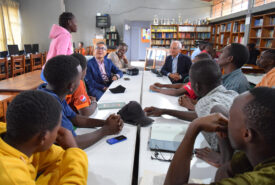Muchas gracias. Thank you.
It’s such a great pleasure to join you for the annual Canadian Chamber of Commerce Day.
The University of Toronto enjoys close ties to Mexico, through our alumni community here, and our partnership with leading Mexican institutions of advanced research and higher education. In addition, our Chancellor – the Honourable Michael Wilson – is a great champion of collaboration between Canada and Mexico. He very much regrets that he is not able to join us here today.
As the title of my talk today indicates, I want to address ‘The Future of Higher Education’ – and to discuss the turbulent, disruptive nature of change in the economy and what it means for universities.
The Education Dividend
More than 75 years ago, the Austrian-American economist Joseph Schumpeter published a book – Capitalism, Socialism and Democracy (1942) – a volume that would become a landmark in the literature on technological change and its social and economic implications. In this book, he coined the phrase ‘creative destruction’ to describe the fundamentally disruptive nature of innovation. The central idea was the observation that economic change is propelled by entrepreneurs who introduce fundamentally new products and new ways of making things. As these entrepreneurial innovations are introduced and take hold, they displace older, inferior technologies and – in many cases – spell the end for established firms, and cause wider economic dislocation for workers and communities.
Schumpeter’s key insight was to show how the demise of the old and the rise of the new are intimately connected – two sides of the same coin. It is a useful starting point for our discussion of higher education in the face of turbulent economic change.

